The United Nations Children’s Fund (UNICEF) said in a report released on Tuesday that the humanitarian situation in Afghanistan takes center stage, and highlighted the severe challenges faced by vulnerable groups.
The report, titled “Spotlight on Social Impact in Afghanistan,” which is released every four months, aims to shed light on themes with significant social impact and draws attention to overlooked consequences on the humanitarian response.
The current edition of the report, covering the period from March to June 2023, focuses on three key themes: healthcare, child protection, and social protection. These themes have been selected based on their observed impact on individuals over time and their potential to affect the daily lives of Afghan citizens.
Afghanistan continues to grapple with a severe humanitarian crisis, with an estimated 28.8 million people, nearly two-thirds of the population, in need of humanitarian assistance. Recent bans imposed on women working for international and local NGOs and the UN, along with other restrictive policies, have exacerbated the already complex protection environment and severely limited operational capacity.
The report highlights the dire state of healthcare in Afghanistan, with inadequate funding, infrastructure, understaffed medical facilities, and shortages of medicine and supplies pushing the healthcare system to the brink of collapse. Shockingly, around 13 million people in Afghanistan are currently deprived of access to healthcare, compounding the already challenging situation.
Children in Afghanistan face significant vulnerabilities, as decades of conflict, political instability, and economic challenges have left many families living in poverty. With children often assuming the role of breadwinners, they are forced into hazardous labor practices, exposing them to violence and criminal activities. The legal and penal system further compounds their vulnerability and amplifies protection challenges.
Additionally, the report sheds light on the growing drug epidemic in Afghanistan, with high addiction rates among adults linked to poverty, unemployment, and easy access to narcotics. The Taliban’s approach to combating this epidemic has been criticized as harsh and rudimentary, focusing on isolating addicts and subjecting them to abrupt withdrawal methods. Inadequate resources, poor-quality treatment facilities, and social stigma surrounding addiction further contribute to the challenges faced by individuals struggling with substance abuse.
The report also highlights the plight of older people in Afghanistan, who confront financial insecurity, limited healthcare access, and social isolation. The suspension of pension payments for retired government employees has plunged many into significant hardships, including food insecurity and social exclusion.
The report concludes with three specific themes that require urgent attention:
1: Access restrictions for women and girls to protection, education, and employability. The Taliban’s policies have severely curtailed women’s and girls’ rights, safety, and access to crucial support services, perpetuating gender inequality and hindering progress towards gender equality and development goals.
2: Restrictions on women’s social life and public presence. Women and girls in Afghanistan face severe limitations on their social life and public engagement, including bans on parks and gyms. These restrictions have adverse effects on women’s health, children’s development, and the overall economy.
3: Taliban civil policies and social initiatives. The Taliban’s policies on women’s rights, marriage, and divorce are inconsistent and compromise previous gains. Child marriages have seen an alarming increase, and the relitigation of divorces often favors abusive husbands. The implementation of related policies and initiatives remains a concern, impacting women’s and girls’ rights and societal well-being.
The report serves as a stark reminder of the critical situation in Afghanistan and calls for immediate action from the international community to address the pressing humanitarian needs and protect the most vulnerable members of society.





